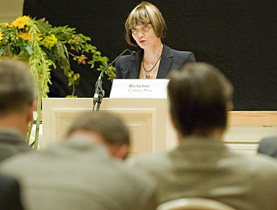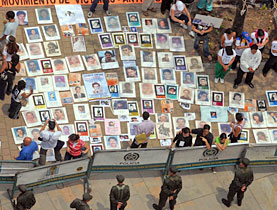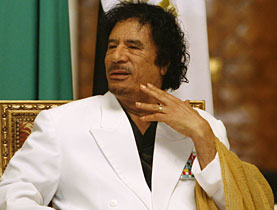Call for dialogue stirs trouble for Calmy-Rey

Swiss Foreign Minister Micheline Calmy-Rey is attracting negative publicity after mentioning the name Osama bin Laden in a speech to ambassadors earlier this week.
Despite a speedy clarification from her ministry press office, the question of what the minister said and what she meant by it – the theme of the speech was dialogue – has provoked intense debate.
The lengthy speech in French to the annual conference of Swiss ambassadors on Monday addressed the issue of holding discussions with groups that might be considered by some as beyond the pale.
In her opening remarks, Calmy-Rey took aim at those who take the moral high ground. She gave a list of parties involved in conflict, rogue states and groups that could never be engaged in dialogue, according to such “moralists”.
“If their advice had been followed, Israel would never have opened dialogue with the Palestinians, the King of Nepal with the Maoists, the Colombian government with Farc,” she said, offering ten other examples.
Then came a series of provocative questions she said all countries had to ask themselves. “So, is it necessary to listen to those right-thinking people? Or should we seek dialogue without discrimination, even going so far as to sit down at a table with [al-Qaeda leader] bin Laden?”
“What should be done when individuals, groups, or states violate international law and its principles?… What are the legitimate means of political action and what should be ruled out?”
Former Swiss ambassador Raymond Lorétan told swissinfo that Calmy-Rey was using an extreme example to make her point that Switzerland should develop its role as an intermediary. “But it is a bad example,” he said.
“There is a risk of damaged credibility – but for Calmy-Rey rather than for Switzerland. She could have said exactly the same thing in a different way.”
Clarification
The minister’s statements formed the basis of an international news agency report claiming that Calmy-Rey favoured dialogue with al-Qaeda and Bin Laden, information that was then picked up by numerous foreign publications. Not so, according to a foreign ministry clarification that appeared the following day.
“She [Calmy-Rey] asked the rhetorical question of whether entering into a dialogue with Bin Laden would be considered as a possibility. She did not state that she would promote such a dialogue, nor has she proposed such a dialogue,” the foreign ministry statement said.
And just to be absolutely clear, “in practice there is no question of the foreign ministry proposing a dialogue with Osama bin Laden,” the statement concluded.
But a quick look at some sensational headlines still doing the rounds, from French newspaper Le Monde to a host of online publications covering the Middle East, shows that the message is already out there.
“Attention seeking”
In the Swiss dailies, the minister’s Osama speech has generated plenty of negative comment.
Le Temps asks why Calmy-Rey took the risk of mentioning the head of al-Qaeda. “Should she not have anticipated that such provocation would make ink flow, that she would provoke misunderstandings and even tensions?”
Der Bund goes so far as to say that Calmy-Rey mentioned the terrorist as an attention-seeking device. “Calmy is no master of diplomacy… she has managed yet again to distract from the substance, set off a storm about the style and make Switzerland look odd abroad”.
The Neue Zürcher Zeitung said that it was obviously wrong of the media to interpret the minster’s comments as an offer of talks with Bin Laden but expressed surprise at how the speech got through internal checks.
“The traditional planned speeches for the annual ambassadors’ conference are usually checked by numerous people for every comma and every imaginable translation error.”
This is not the first time that the foreign minister has been at the centre of a political storm. Her controversial visit to Iran in March, where she was present at the signing of a Swiss-Iranian natural gas purchase agreement, drew sharp criticism from Israel and the US.
Nevertheless Andreas Gross, a parliamentarian from the Calmy-Rey’s centre-left Social Democratic Party, denies her actions and statements as foreign minister have damaged Switzerland’s reputation abroad.
“Her great achievement is that the Swiss see that there is somebody who wants to make Switzerland heard on the global level and that we should establish a foreign policy. This might also come as a surprise to other governments,” he told swissinfo.
Gross believes Switzerland should try to solve conflicts wherever possible – “but we’re no longer as able to do this as we sometimes seem to think. Today this is also much more a joint effort and Switzerland is still sometimes politically lonely”.
Swiss conflict resolution policy promotes dialogue with all parties, including militant Muslim groups, and attempts to bridge divisions between the region and the West.
Switzerland for example is currently the only western state that has chosen not to isolate the militant Palestinian Islamic Hamas movement.
Swiss Foreign Minister Micheline Calmy-Rey has been attacked for some of her dealings with Iran, which included attending the signing of a controversial gas pipeline deal between Iran and a Swiss energy company in Tehran.

In compliance with the JTI standards
More: SWI swissinfo.ch certified by the Journalism Trust Initiative












You can find an overview of ongoing debates with our journalists here . Please join us!
If you want to start a conversation about a topic raised in this article or want to report factual errors, email us at english@swissinfo.ch.